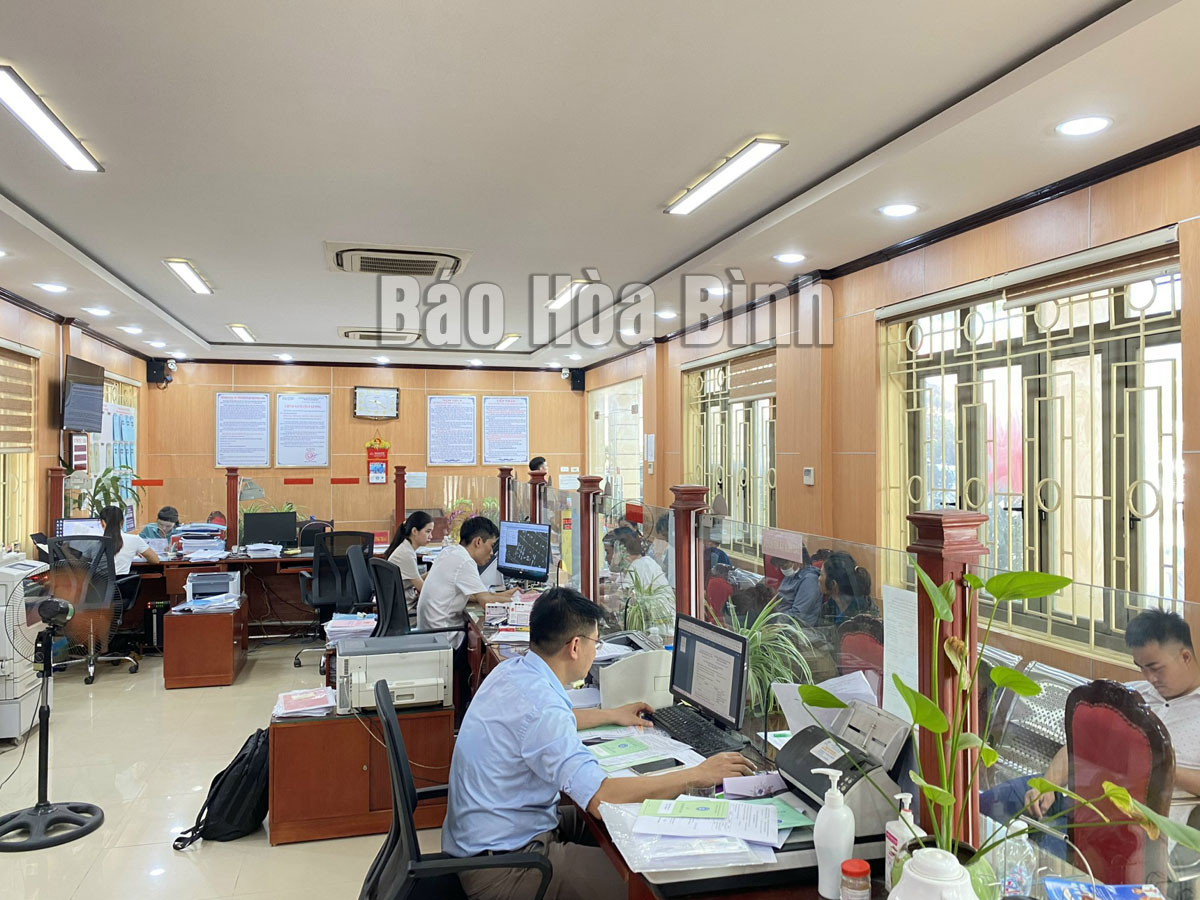
(HBO) – The northern province of Hoa Binh has attached importance to invest in information technology infrastructure and building e-administration to improve the quality of public services.
The Lac Thuy District People’s Committee applies information technology in processing administrative procedures for people and enterprises.
Currently, five enterprises are investing in telecommunications
infrastructure and providing telecommunications and internet services, namely
VNPT Hoa Binh, and branches of Viettel, FPT, MobiFone, and Vietnamobile.
Landline service is available in all of its 151 communes. The 2G/3G/4G mobile
networks covered all communes, wards, and towns in the province.
The province’s mobile service coverage rate by residential area
reached 95.8% as all of its communes, wards and townss have mobile base
stations (BTS).
There are over 900,000 telephone subscribers and 120,000 fixed
broadband subscribers in the province. It now has over 9,000 km of fiber optic
lines.
The provincial Department of Information and Communications
proposed the Ministry of Information and Communications allow three
telecommunications service providers Viettel, VNPT, and MobiFone to install 41
BTS stations in 41 villages/hamlets in the province to help local people better
access information and support online teaching and learning.
The province asked the Ministry of Information and
Communications to allocate 11,034 tablets for poor and near-poor households.
The province proposed 13 locations to install BTS stations in districts and
cities.
It implemented cooperation agreements that the provincial People's Committee
signed with Viettel Group and Vietnam Posts. Under the agreements, the
corporations have invested in infrastructure and facilities to enhance service
capabilities and develop a post and telecommunications system across the
province.
Up to now, all state agencies in the province have an internal
network (LAN) and broadband internet connection. Up to 98% of the cadres, civil
servants, and public employees at the provincial level are equipped with
computers. The rate at the district and commune levels is 91% and 88%,
respectively.
Specialised data transmission networks of Party and State
agencies are deployed at 183 points, of which, 32 points are at departments,
agencies, People's Committees of districts and cities, and 151 points at
People's Committees of communes, wards, and townships.
Some departments and sectors such as the Departments of
Education and Training; Finance; Natural Resources and Environment; Public
Security, and the Office of the provincial People's Committee established small
data centres with three to ten servers to install specialised software and
databases.
The province's online video conferencing system is deployed with
11 connecting points from the provincial People's Committee to ten districts
and cities. In addition, all ten districts and cities in the province actively
invest and deploy online video conferencing systems from the district to the
commune level, increasing efficiency in organising meetings and saving travel
time.
The provincial People’s Committee implemented a paperless
meeting room system from the third quarter of 2021.
Bui Duc Nam, Director of the Department of Information and
Communications, said that IT infrastructure development has left an important
impact on the operation of the province's socio-economic infrastructure system.
In the coming time, the department will continue to increase
consultancy and proactively propose to the Ministry of Information and
Communications and the provincial People's Committee to issue documents to
better manage relevant issues.
In particular, it will closely coordinate with sectors and
localities to develop investment plans for key infrastructure development in
which IT and communication infrastructure will be prioritised./.
Hoa Binh province is undergoing a dynamic transformation amid Vietnam’s national digital transition. Building on Poliburo’s Resolution No. 57-NQ/TW on breakthroughs in science, technology, innovation, and national digital transformation, the province has rolled out a wide range of practical action plans. A standout initiative is the "Digital Literacy for All” movement, an effort to ensure that no one is left behind in the digital era.
Hoa Binh province is undergoing a dynamic transformation in the wake of the national digital transformation movement. Building on Resolution No. 57-NQ/TW of the Politburo on breakthroughs in science, technology, innovation, and national digital transformation, the province has implemented a wide range of practical action plans. A standout initiative is the "Digital Literacy for All” movement ambitious effort to ensure that no one is left behind in the digital age.
With a spirit of unity and proactive problem-solving, the Party Committee, the government and the people of Dong Lai Commune (Tan Lac District) have made great strides in implementing the resolutions of the 24th Party Congress of the commune for the 2020 - 2025 term. Focusing on leadership and practical actions, the commune has brought the Party’s resolutions into daily life, creating strong impacts and pushing the local development forward.
Amid the nationwide push for digital transformation, young people in Hoa Binh Province are stepping up as dynamic pioneers, applying technology to enhance Youth Union operations and expand the reach of youth-led initiatives. Through creativity and adaptability, Youth Union organizations at all levels have introduced a series of practical solutions, contributing to modern governance and community development.
In recent years, An Nghia commune, located in Lac Son district, has stepped up administrative reform, focusing on improving the quality and efficiency of its single-window service unit for receiving and processing administrative procedures. These improvements have helped create favourable conditions for local residents and organisations to handle administrative procedures, contributing to the commune’s broader socio-economic development.
The Prime Minister-approved master plan to develop the multi-use value of forests ecosystems through 2030, with a vision to 2050, aims to improve the management and sustainable use of forest resources, create jobs, increase incomes, and improve the living standards of ethnic minorities, people in mountainous and remote areas, forest workers and those living near forests.



